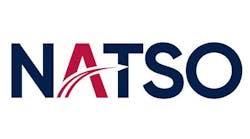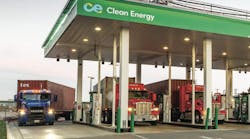Fleets are still gaining ground in overall fuel efficiency of their Class 8 tractors, though the needle didn't move quite as far up in 2016. Compared with the national average Class 8 fuel economy, however, the uptick in average fuel economy at 19 carrier fleets in a new study represents savings of more than $7,000 per truck.
In the latest update of the North American Council for Freight Efficiency's (NACFE) Annual Fleet Fuel Study, the 19 participating fleets operating more than 71,000 tractors and 234,000 trailers saw a 1% collective gain in fuel economy in 2016 by adopting a variety of fuel efficiency technologies. The improvement refers to year-over-year fuel efficiency of those same fleets' trucks in total.
"It's only 4% of the population" of all Class 8 tractors in use across the United States, noted Mike Roeth, executive director of NACFE and operations lead for Trucking Efficiency, a joint initiative between NACFE and Carbon War Room that reports on truck fuel efficiency technologies. "But it represents a pretty strong group of truckers and fleets out there," he said.
The study fleets reached an average fuel economy of 7.11 mpg, compared with a total U.S. fleet average of 5.89. The newest trucks continued to push the bar higher, achieving 7.8-9.2 mpg, with some "approaching 10 mpg," according to NACFE.
Based on the data, it's the 10th consecutive year that these trucking fleets boosted their fuel economy, though the 1% overall improvement in fuel efficiency is down from a 3% boost last year. Even so, again, that 1% figure is a total "sea level" rise among all the fleets' tractors and doesn't tell the whole story.
Along those lines, don't get a sense that the potential for fuel efficiency gains in trucks has been maxed out. Trucking Efficiency is also promoting fuel savings opportunities in the industry through Run on Less, a cross-country roadshow highlighting truck fuel efficiency. NACFE hinted that the seven trucks that'll finish Run on Less when they arrive at the inaugural North America Commercial Vehicle show in Atlanta Sept. 25 may have an impressive story to tell.
Dave Schaller, industry engagement director at NACFE, also stressed that the Annual Fleet Fuel Study presents collective fuel efficiency of all the participating fleets' tractors, some of those being older models and some newer. "Our Run on Less event is going to be predominantly very new tractors, and if you think they're going to average 7 mpg, we've got a big surprise for you," he said on a call with reporters.
Fuel savings still add up
Even with the more modest overall gain for 2016, a collective 7.11 mpg for the 19 fleets' tractors worked out to total savings of nearly $500 million or $7,020 per year per truck, compared with the national average Class 8 fuel economy. And that's with fuel at $2.31 per gallon.
By comparison, using a four-year average fuel cost of $3.89 per gallon in the calculation, the fleets' average mpg would've meant $11,872 savings per year per truck, according to NACFE.
The organization listed a number of reasons driving the lower overall fuel efficiency gain last year, including:
—A decreased overall focus on fuel economy for fleets, with fuel prices remaining low and other issues perhaps looming larger on the horizon;
—A hotter year in 2016, requiring drivers to idle their trucks more to run air conditioning;
—Somewhat lesser new truck model year mpg gains in 2016;
—Fleets holding onto their older, less efficient trucks longer due to a weak used truck market and other factors;
—Trucks running at faster speeds and thus cutting into mpg, with some states upping their speed limits; and
—A few of the study fleets using more compressed natural gas tractors, which "struggle" somewhat to achieve higher efficiencies, Roeth said, due to an inherent lower energy content of CNG and a lack of other fuel efficiency technologies on those trucks compared with their diesel counterparts.
Low fuel prices and efforts to target maintenance costs may also be making fleets less inclined to downsize engines in some cases. "It's not a big movement, but we saw a drop in the 13L and 11L penetration in some fleets where they may be going back to 15L," Roeth noted.
In this latest look at their progress, the fleets chose from a palette of 85 fuel-saving technologies vs. 69 in last year's report. NACFE pointed out that all 85 couldn't be put on a truck, since some are "either or" options. Of note — and also another contributing factor to the lower overall fuel efficiency improvement in 2016, according to NACFE — the study fleets de-emphasized certain technologies like 6x2 axles and trailer-end aerodynamic modifications on new trucks.
At the same time, other fuel efficiency technologies saw significant increases in adoption rates among the study fleets. Some examples of those included two-speed fan clutches, automated manual transmissions, predictive cruise control and tractor wheel covers.
Fleets that provided data for the 2017 study include Bison Transport, Cardinal Logistics, CFI, CR England, Challenger Motor Freight, Crete, Frito-Lay, Maverick, Mesilla Valley Transportation, NFI Industries, Nussbaum, Paper Transport, Prime, Ryder System Inc., Schneider, United Parcel Service, and US Xpress. Another fleet provided data from past years and no longer participates, but its information is still included.
"Fleets are still seeing fuel economy improvements from their investments. While gains are smaller than in the past, any improvement in fuel economy curbs the fleet's expenses," Roeth said.



